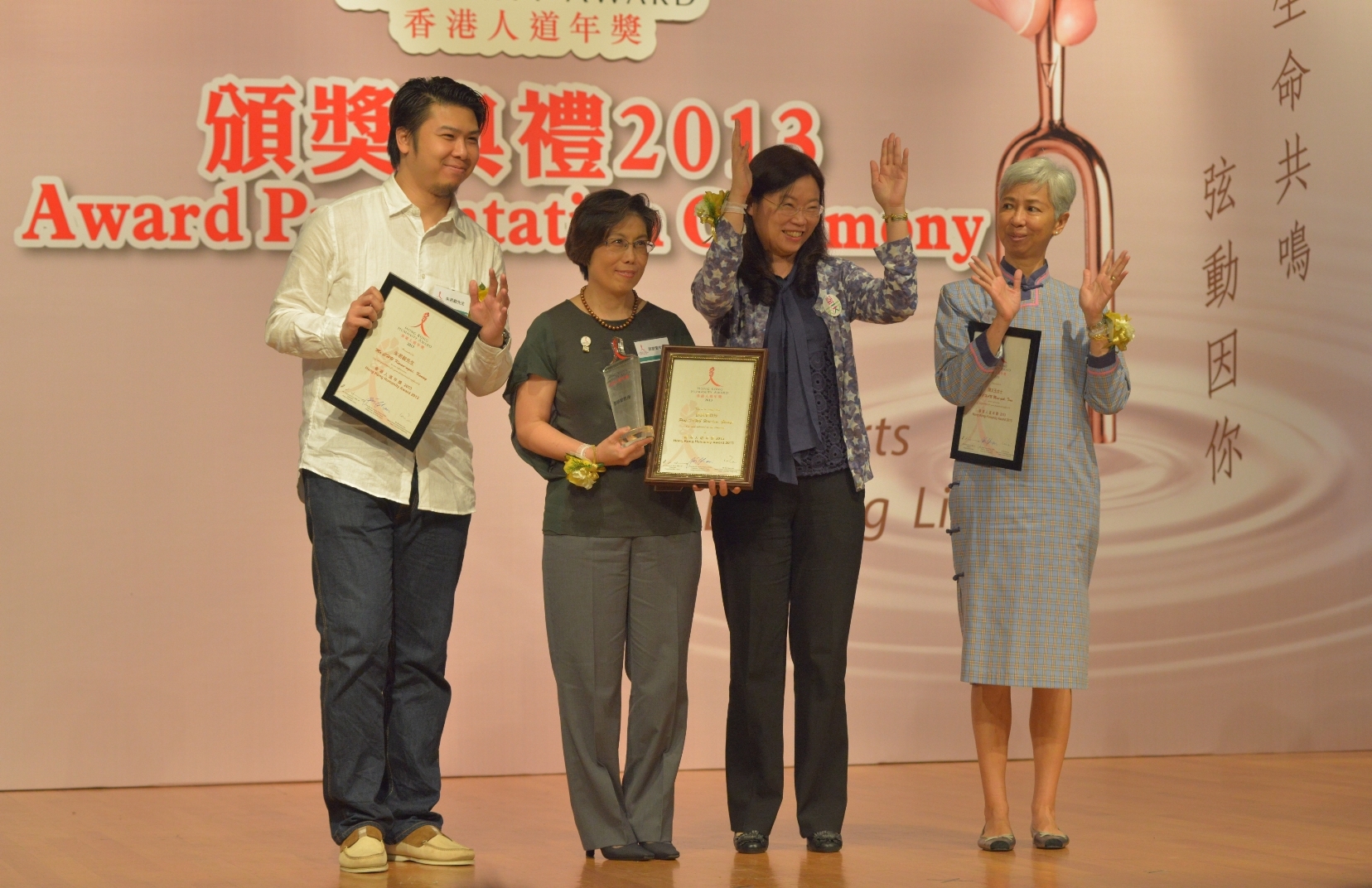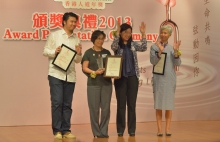CUHK
News Centre
CUHK Prof. Gladys Tang Receives the Hong Kong Humanity Award 2013
Prof. Gladys Wai-lan Tang, Director of the Centre for Sign Linguistics and Deaf Studies at The Chinese University of Hong Kong (CUHK) was presented the Hong Kong Humanity Award 2013 today (25 May). The award was co-organized by the Hong Kong Red Cross and Radio Television Hong Kong with the aim of recognizing the role models who live up and put into practice the spirit of humanity.
Prof. Gladys Tang has been conducting linguistic research on Hong Kong Sign Language (HKSL) and deaf children’s acquisition of signed language and spoken language since the 1990s. She notices that the general misconceptions about signed language in society has undermined the importance of using this language in educating deaf students; therefore, deaf people have been denied equal opportunities for education and employment. Professor Tang determines to improve deaf students’ opportunities for higher education; she hopes that, besides the oralist approach, deaf students in Hong Kong may enjoy the benefits of the sign bilingual approach in their education, i.e. being taught in signed language and spoken language.
With the funding support of The Nippon Foundation, Professor Tang has launched a few diploma programmes and a higher diploma programme in sign linguistics and sign language teaching for deaf adults of Hong Kong and Asia. These programmes aim to qualify deaf students for higher education; alternatively, they may become professional sign language instructors. Some deaf graduates of the programmes are currently part-time instructors for the elective courses in HKSL at CUHK. Their teaching enhances the sign language competency of university students and raises their deaf awareness.
Professor Tang points out that a great majority of deaf children are in mainstream education and their learning under those environments is quite difficult due to the oralist approach. Even in special schools, teachers tend to give lessons orally. Between 2002 and 2006, Professor Tang collaborated with the Education Bureau in an attempt to introduce ‘sign bilingualism’ in educating deaf students. Under the scheme, deaf instructors were hired to work with hearing teachers in the classroom. The scheme received highly positive response from the students whose Chinese language competency also showed significant improvement.
For the betterment of deaf children, Professor Tang has been raising funds for educational and research endeavors. Her research in language acquisition of deaf children has been supported by Dr. Alex K. Yasumoto’s donation. In 2006, she received funding support from The Hong Kong Jockey Club Charities Trust to experiment on ‘sign bilingualism and co-enrollment’ in mainstream education. So far a kindergarten and a primary school have been participating in the programme. Together with baby signing classes and Chinese reading classes, the programme benefits more than 70 deaf children each year. With the support of the Lee Hysan Foundation, a mainstream secondary school will soon join force with Professor Tang to provide secondary education for deaf students and hearing students, allowing them to continue to learn and grow up together. In six years, the first batch of students educated using the philosophy of sign bilingualism and co-enrollment will be expected to enter university together. It is hoped that some of them will become the next generation of professional sign language interpreters.
Professor Tang said, ‘The award does not belong to me only. It belongs to every member of the Centre for Sign Linguistics and Deaf Studies at CUHK. Without them, I will not be able to appreciate the rich and unique linguistic properties of sign languages. It is my hope that the Hong Kong Humanity Award will raise the society’s awareness that language, whether signed or spoken, will have an effect on deaf people’s personal development and cultivation of self-value. While there are increasing signed language and oral language services offered by the society, tertiary institutions in Hong Kong may work together in identifying affirmative measures to support deaf people to receive higher education, to rectify the unfavorable situation as noted by the United Nations that the number of students with disability receiving higher education in Hong Kong is regrettably low.
CUHK has committed itself to upholding the humanistic spirit since its establishment. It strives to develop students’ social responsibility and civic engagement, and to encourage researchers to translate academic knowledge into action to improve the social, cultural, environmental and economic fabric of our society. Professor Tang transferred her sign linguistics research of many years to the community, in order to dispel certain long-standing misconceptions about deaf education, language rehabilitation, social welfare for the deaf, communication between the deaf and hearing people, thus promoting social inclusion. As such, it is an embodiment of the humanistic spirit of CUHK.
Professor Tang is the fifth CUHK scholar receiving the Hong Kong Humanity Award. The other four CUHK academics who have previously received this honour are: Prof. Emily Ying-yang Chan and Prof. Martin Chi-sang Wong, both are associate professors of the Jockey Club School of Public Health and Primary Care; Prof. Ping-chung Leung, Emeritus Professor of Orthopaedics and Traumatology; and Prof. Edward Yan-yung Ng, Professor, School of Architecture.
About Hong Kong Humanity Award
The Hong Kong Humanity Award is co-organized by the Hong Kong Red Cross and Radio Television Hong Kong. The Award, initially incepted in 2007, is the very first award of its kind in Hong Kong aims to give tribute to people dedicated in humanitarian deeds and to disseminate the universal value of humanity to all levels of the society. The recipients have served as a paragon demonstrating how people can care about others out of pure volunteerism and disseminating the spirit of humanity to different sectors in the community.



